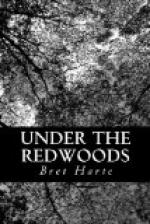This was easy in his defenceless state, and his manifest delight in their rude encampment and gypsy life, although he had been one of Li Tee’s oppressors in the past. But that stolid pagan had a philosophical indifference which might have passed for Christian forgiveness, and Jim’s native reticence seemed like assent. And, possibly, in the minds of these two vagabonds there might have been a natural sympathy for this other truant from civilization, and some delicate flattery in the fact that Master Skinner was not driven out, but came of his own accord. Howbeit, they fished together, gathered cranberries on the marsh, shot a wild duck and two plovers, and when Master Skinner assisted in the cooking of their fish in a conical basket sunk in the ground, filled with water, heated by rolling red-hot stones from their drift-wood fire into the buried basket, the boy’s felicity was supreme. And what an afternoon! To lie, after this feast, on their bellies in the grass, replete like animals, hidden from everything but the sunshine above them; so quiet that gray clouds of sandpipers settled fearlessly around them, and a shining brown muskrat slipped from the ooze within a few feet of their faces—was to feel themselves a part of the wild life in earth and sky. Not that their own predatory instincts were hushed by this divine peace; that intermitting black spot upon the water, declared by the Indian to be a seal, the stealthy glide of a yellow fox in the ambush of a callow brood of mallards, the momentary straying of an elk from the upland upon the borders of the marsh, awoke their tingling nerves to the happy but fruitless chase. And when night came, too soon, and they pigged together around the warm ashes of their camp-fire, under the low lodge poles of their wigwam of dried mud, reeds, and driftwood, with the combined odors of fish, wood-smoke, and the warm salt breath of the marsh in their nostrils, they slept contentedly. The distant lights of the settlement went out one by one, the stars came out, very large and very silent, to take their places. The barking of a dog on the nearest point was followed by another farther inland. But Jim’s dog, curled at the feet of his master, did not reply. What had he to do with civilization?
The morning brought some fear of consequences to Master Skinner, but no abatement of his resolve not to return. But here he was oddly combated by Li Tee. “S’pose you go back allee same. You tellee fam’lee canoe go topside down—you plentee swimee to bush. Allee night in bush. Housee big way off—how can get? Sabe?”
“And I’ll leave the gun, and tell Dad that when the canoe upset the gun got drowned,” said the boy eagerly.
Li Tee nodded.
“And come again Saturday, and bring more powder and shot and a bottle for Jim,” said Master Skinner excitedly.
“Good!” grunted the Indian.
Then they ferried the boy over to the peninsula, and set him on a trail across the marshes, known only to themselves, which would bring him home. And when the Editor the next morning chronicled among his news, “Adrift on the Bay—A Schoolboy’s Miraculous Escape,” he knew as little what part his missing Chinese errand boy had taken in it as the rest of his readers.




